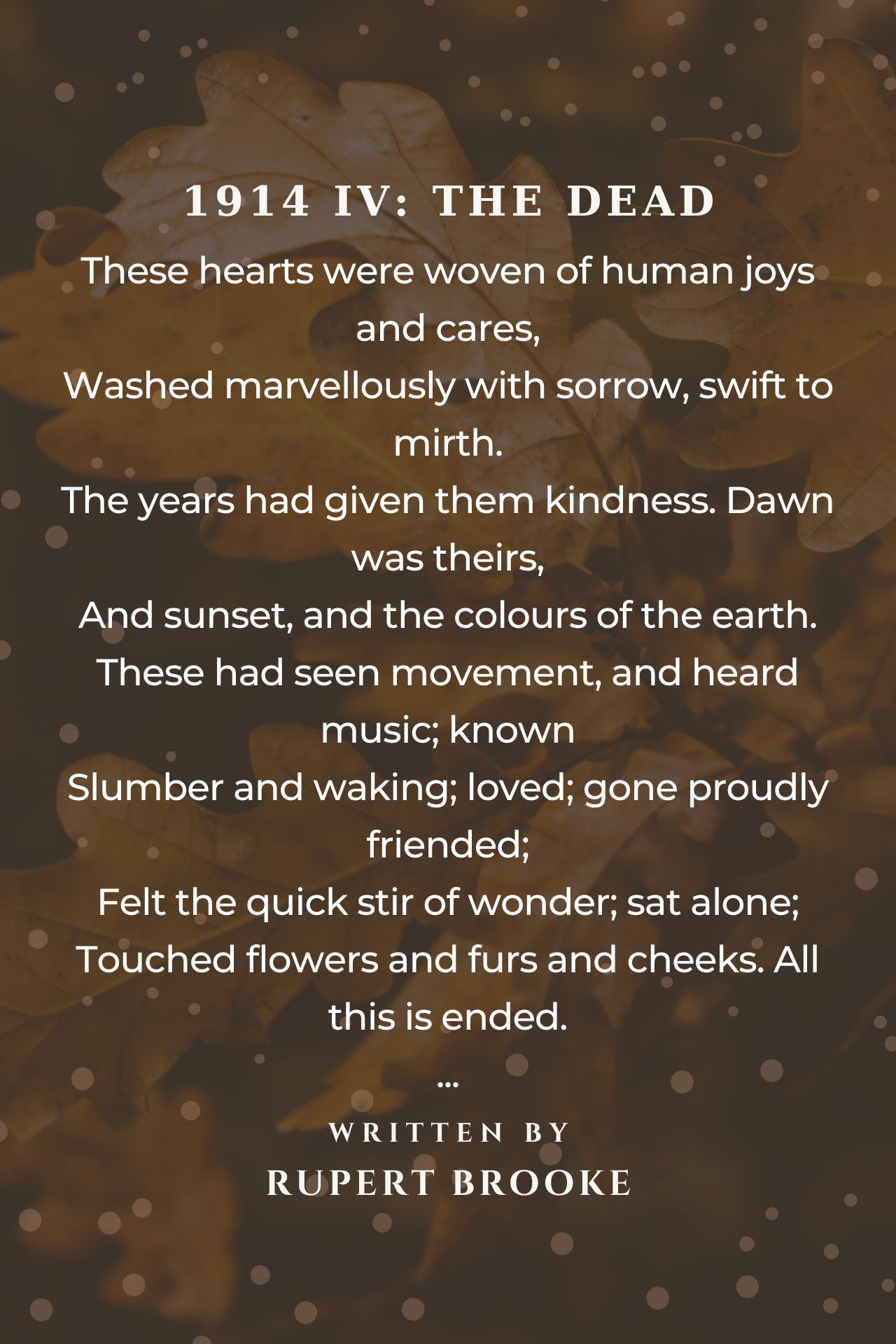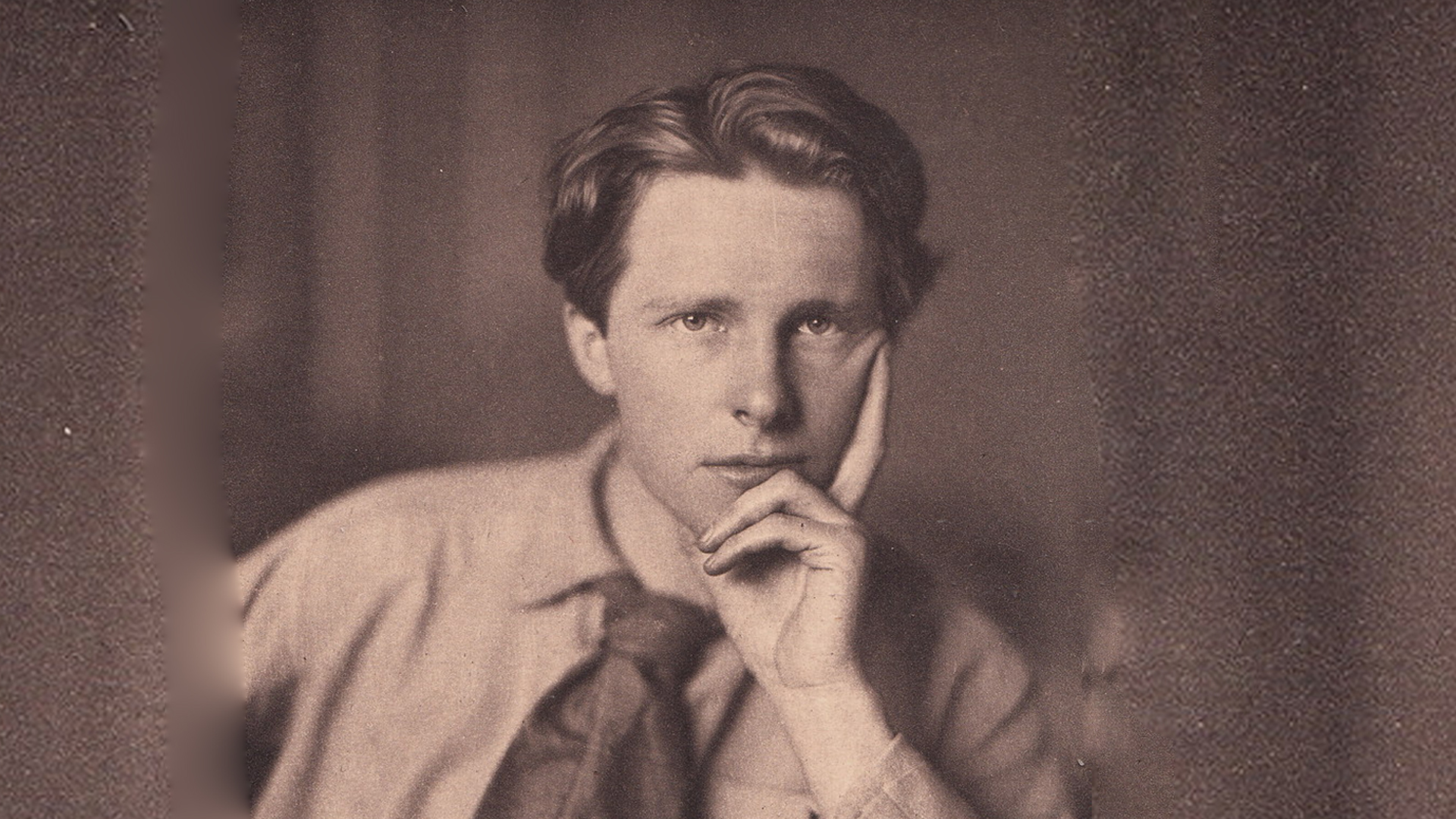1914 Iv: The Dead Poem by Rupert Brooke
1914 Iv: The Dead
These hearts were woven of human joys and cares,
Washed marvellously with sorrow, swift to mirth.
The years had given them kindness. Dawn was theirs,
And sunset, and the colours of the earth.
These had seen movement, and heard music; known
Slumber and waking; loved; gone proudly friended;
Felt the quick stir of wonder; sat alone;
Touched flowers and furs and cheeks. All this is ended.
There are waters blown by changing winds to laughter
And lit by the rich skies, all day. And after,
Frost, with a gesture, stays the waves that dance
And wandering loveliness. He leaves a white
Unbroken glory, a gathered radiance,
A width, a shining peace, under the night.

War puts an end to all cheers of life in death! This poem reminds us of what sort of innocent hearted men we have lost in that war! Most moving poem!
Brooke had no idea of war was like at the sharp end. He had a school boys view of it, much like that of the school boys in the film All Quiet On the Western Front. To gauge the worth of this nonsense compare Wilfred Owen’s “What passing bells for these who die as cattle…”. WWI was noble and glorious for nobody but the Grim Reaper. Stand Brooke in the trenches for a year with the stink of the rotting flesh of his comrades in his nose, and the rats crawling over his feet, and the ever-present prospect of death by sniper or barrage – let him charge uselessly across no man’s land into the certain death of the machine gun – and then let him write. The Duke of Wellington said: “Nothing except a battle lost can be half so melancholy as a battle won.” Because a poem is well-written does not make it a good poem. A good poem communicates the truth – and this is not the truth.
The poet used a great deal of metaphors to make the poem effective.In this way he achieved to make it be full of mistery and emotion.First he describes soldiers as normal human beings; they have sorrows, happiness, they love and are loved etc.But after entering the army, their lives change and differ from other people`s life in some aspects.The most important one is that they die honourably and leave peace and an unerasadle name behind them...
Profound, and exquisitely drafted is this wonderful work of art.
War like many things brings out the beauty as well as the ugliness of life. I think that these poems are refreshing in their positive outlook. Having been in military service myself and witnessed the destruction of friend and foe alike I feel justified in offering my comment here.
According to what I have read, Brooke in fact saw action in the siege of Antwerp, a grim Allied defeat. While I agree with some of what Kevin Straw says, this is much the best of his five war sonnets in my opinion, and is free of the bs we find in the others, so I don't know why Straw has chosen this one to lambast. It merely commemorates the dead.

Brooke had no idea of war was like at the sharp end. He had a school boys view of it, much like that of the school boys in the film All Quiet On the Western Front. To gauge the worth of this nonsense compare Wilfred Owen’s “What passing bells for these who die as cattle…”. WWI was noble and glorious for nobody but the Grim Reaper. Stand Brooke in the trenches for a year with the stink of the rotting flesh of his comrades in his nose, and the rats crawling over his feet, and the ever-present prospect of death by sniper or barrage – let him charge uselessly across no man’s land into the certain death of the machine gun – and then let him write. The Duke of Wellington said: “Nothing except a battle lost can be half so melancholy as a battle won.” Because a poem is well-written does not make it a good poem. A good poem communicates the truth – and this is not the truth.